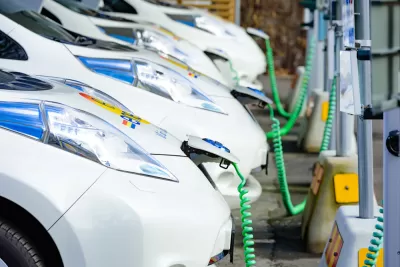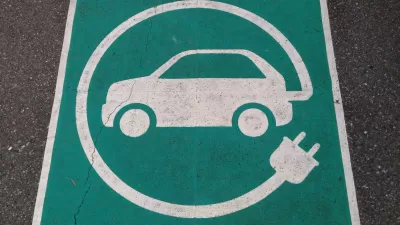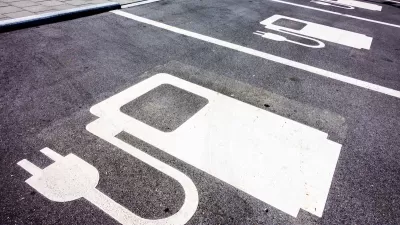Shifting municipal fleets to electric vehicles poses some challenges, but cities can take steps today to prepare for an easier transition to an electric future.

While many cities have pledged to electrify their municipal fleets—including police cars, transit buses, street sweepers, and other vehicles—meeting their goals may be difficult due to a number of factors. As Sharon O'Malley writes on Route Fifty, in additions to concerns about up-front costs (an electric Ford pick-up, for example, costs around $10,000 more than the gas-powered version), "some fleet managers have complained that electric vehicle technology has lagged behind their eagerness to bring electric-powered heavy-duty trucks and equipment on board." City leaders worry that electric heavy machinery like snowplows won't function as effectively or require too much time to recharge.
Some cities, like Portland, Oregon, which has committed to a fully electric city fleet by 2050, have found ways to save costs on charging infrastructure. "To prepare, the city struck a subscription-type deal with a vendor of charging stations so it pays monthly to plug in its cars and trucks rather than laying out the capital to build the stations itself. In turn, it uses its savings on fuel to help pay for charging, making it an operating cost rather than a capital expense."
O'Malley writes that experts advise cities to make strategic decisions to decarbonize their fleets most efficiently, like replacing the cars and trucks that rack up the most miles, which will save more money on fuel. Alan Bates, fleet business operations manager for Portland, says departments like parking enforcement offer "low-hanging fruit" for electrification, offering Portland's three-wheel parking enforcement scooters as an example. "They’re not driving a ton of miles, they’re stop and go, they easily get enough charge every night to come back in the morning and run their routes." Others encourage cities to at least give electric vehicles a test drive in order to "demystify the process" and win over EV skeptics.
FULL STORY: Why Fully Transitioning Municipal Fleets to Electric Vehicles Isn't Easy

Alabama: Trump Terminates Settlements for Black Communities Harmed By Raw Sewage
Trump deemed the landmark civil rights agreement “illegal DEI and environmental justice policy.”

Planetizen Federal Action Tracker
A weekly monitor of how Trump’s orders and actions are impacting planners and planning in America.

The 120 Year Old Tiny Home Villages That Sheltered San Francisco’s Earthquake Refugees
More than a century ago, San Francisco mobilized to house thousands of residents displaced by the 1906 earthquake. Could their strategy offer a model for the present?

San Francisco Opens Park on Former Great Highway
The Sunset Dunes park’s grand opening attracted both fans and detractors.

Oregon Legislature to Consider Transit Funding Laws
One proposal would increase the state’s payroll tax by .08% to fund transit agencies and expand service.

Housing Vouchers as a Key Piece of Houston’s Housing Strategy
The Houston Housing Authority supports 19,000 households through the housing voucher program.
Urban Design for Planners 1: Software Tools
This six-course series explores essential urban design concepts using open source software and equips planners with the tools they need to participate fully in the urban design process.
Planning for Universal Design
Learn the tools for implementing Universal Design in planning regulations.
Clanton & Associates, Inc.
Jessamine County Fiscal Court
Institute for Housing and Urban Development Studies (IHS)
City of Grandview
Harvard GSD Executive Education
Toledo-Lucas County Plan Commissions
Salt Lake City
NYU Wagner Graduate School of Public Service





























